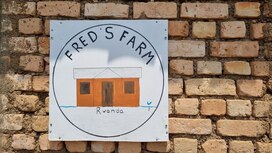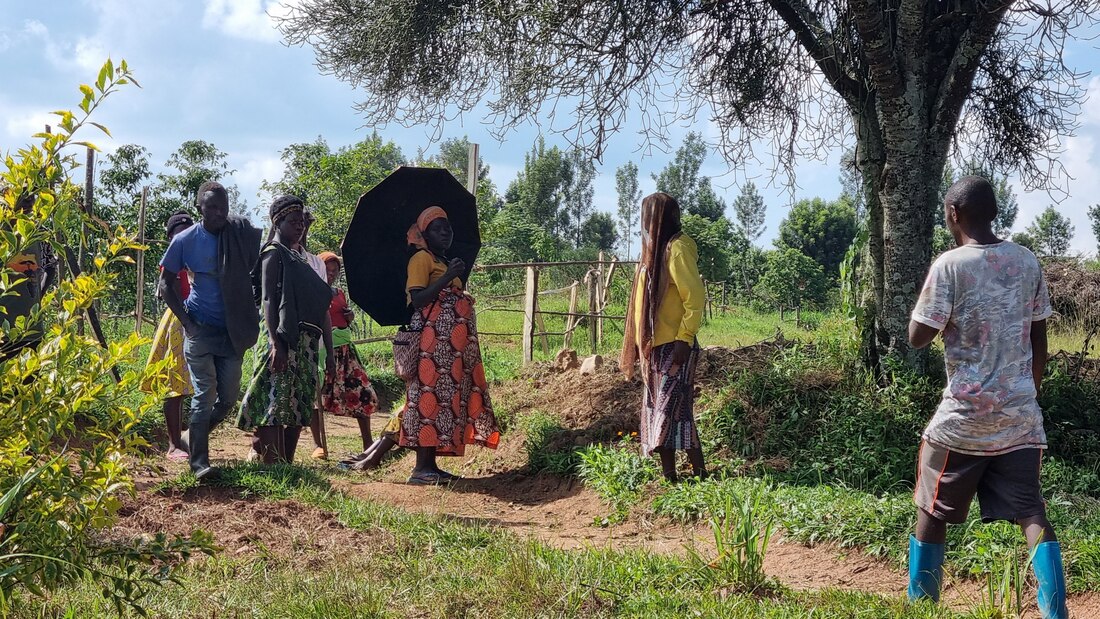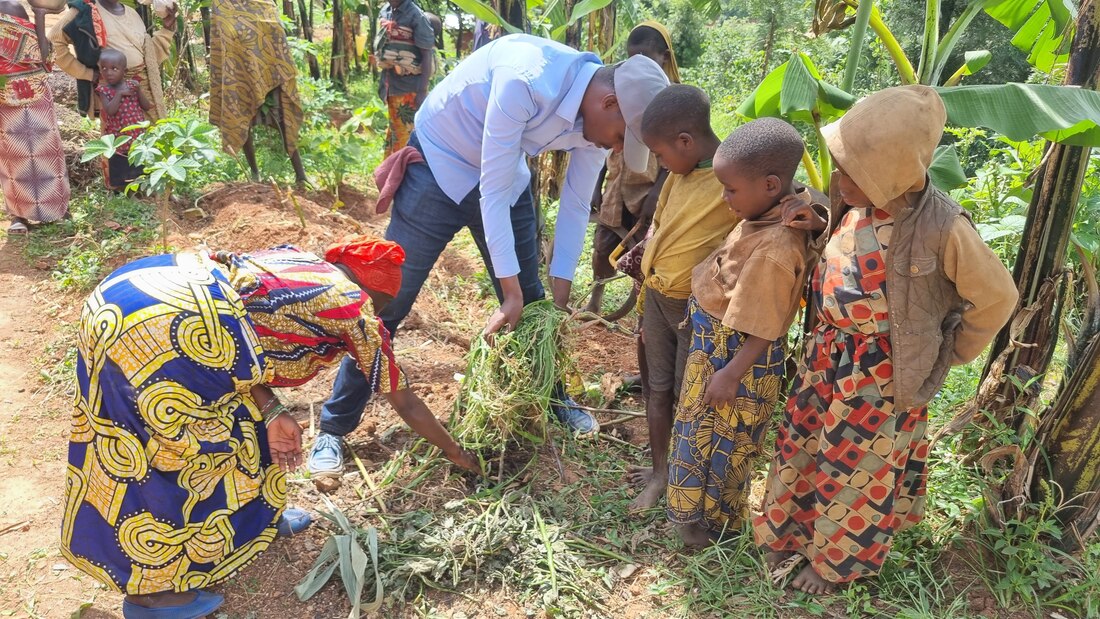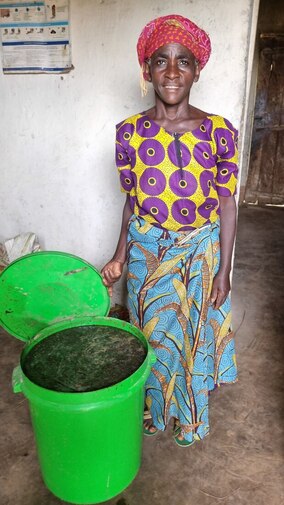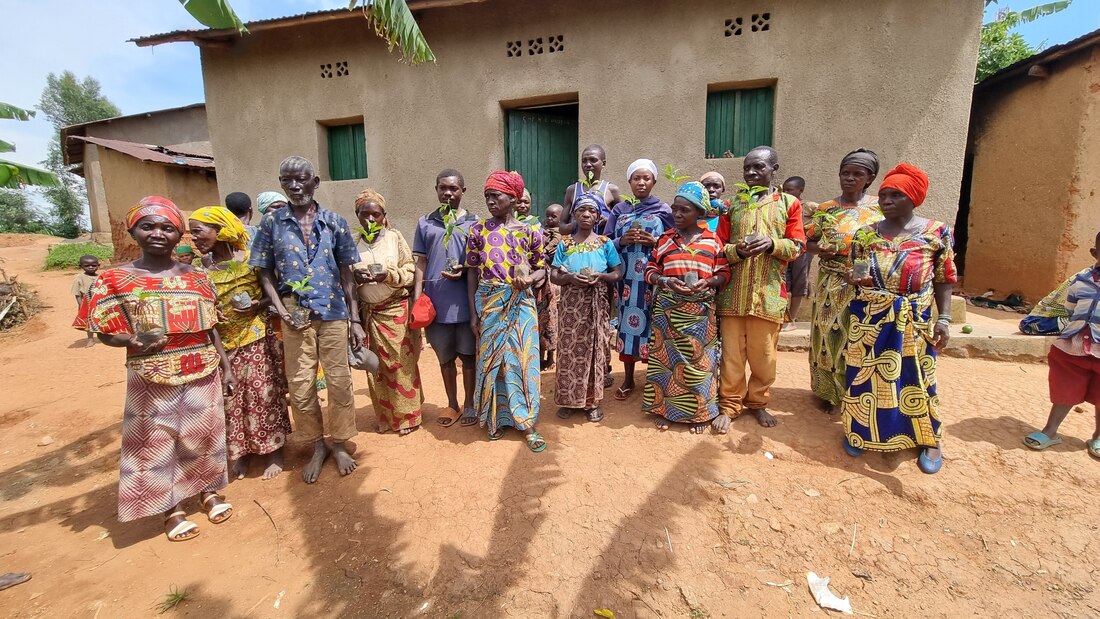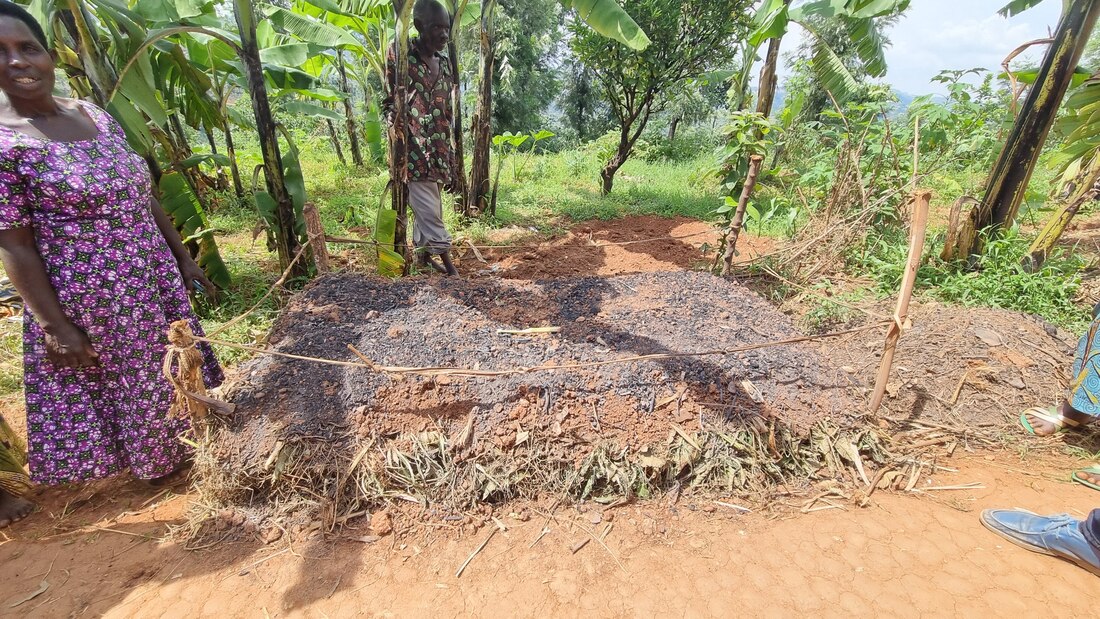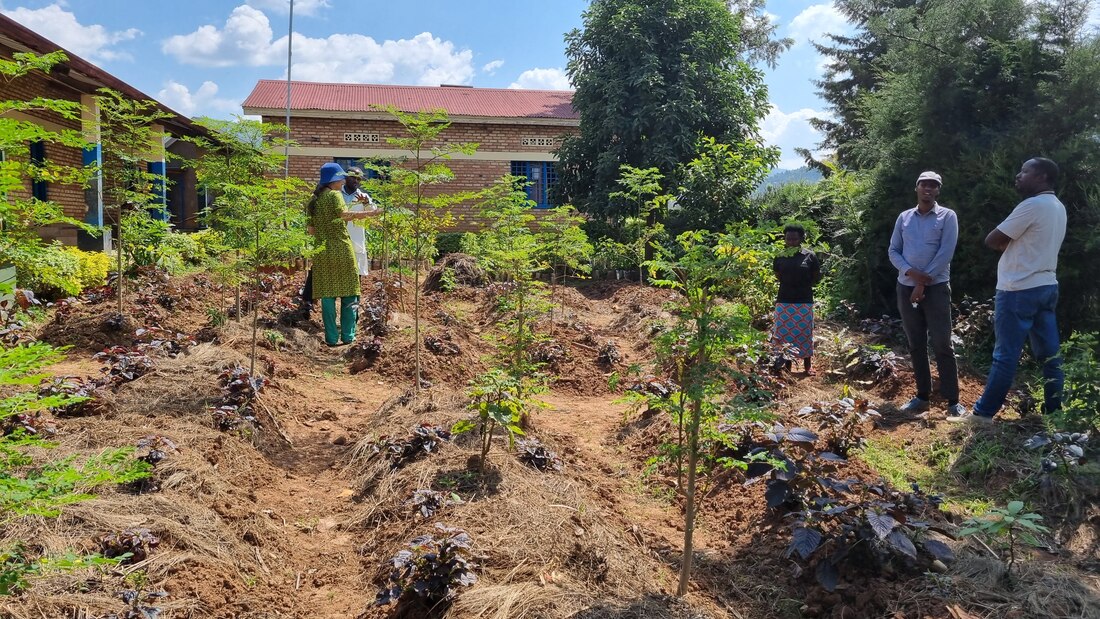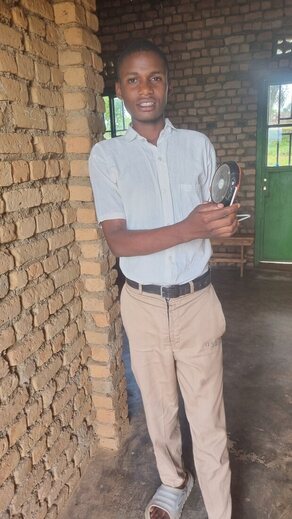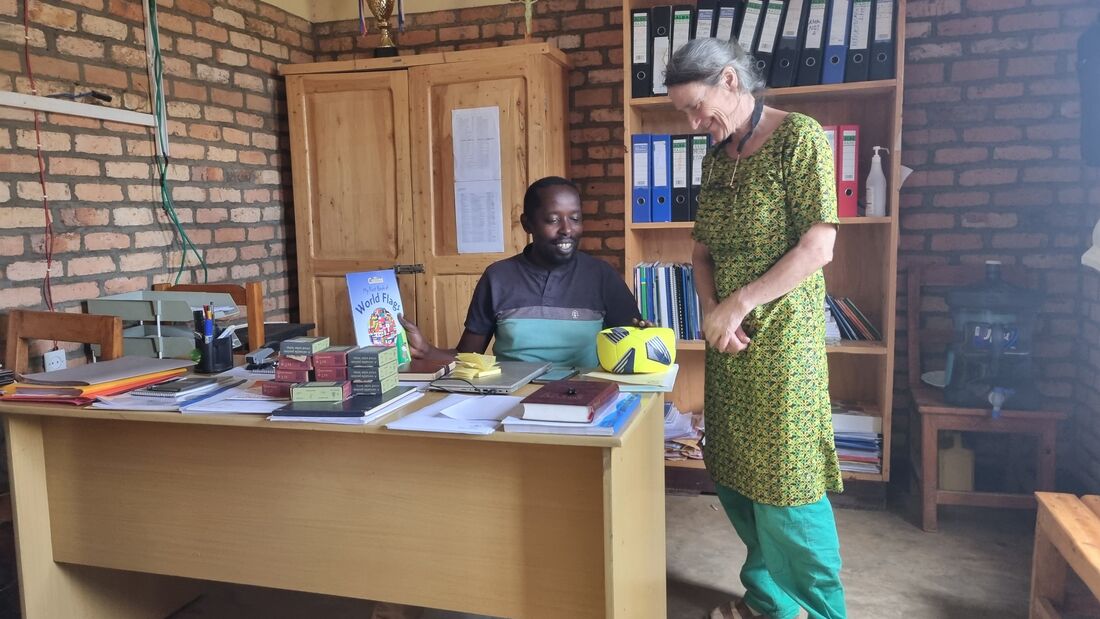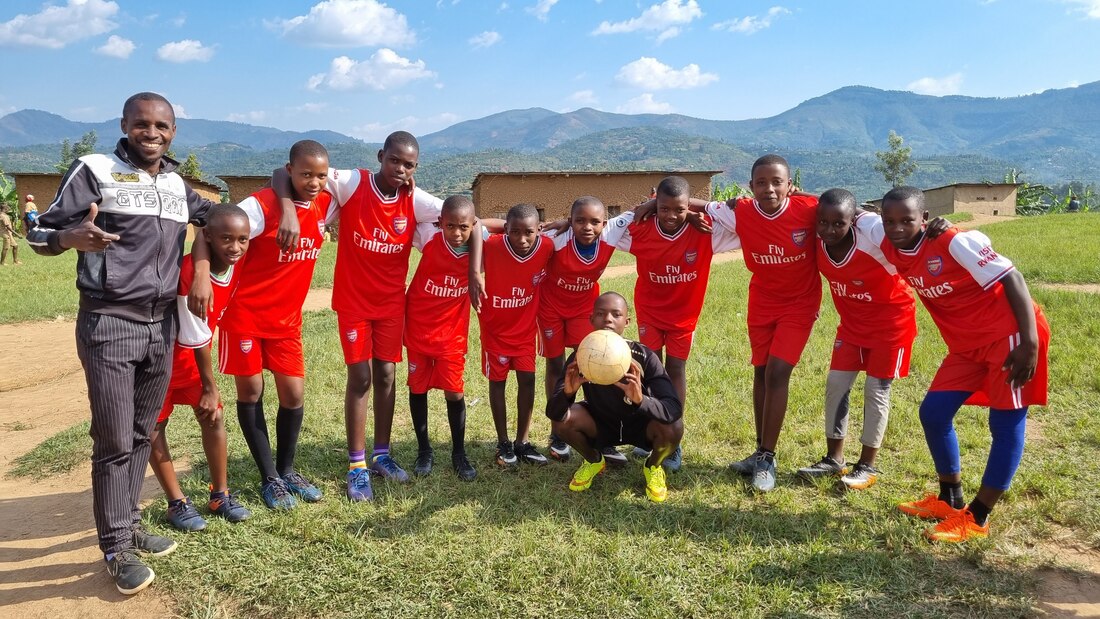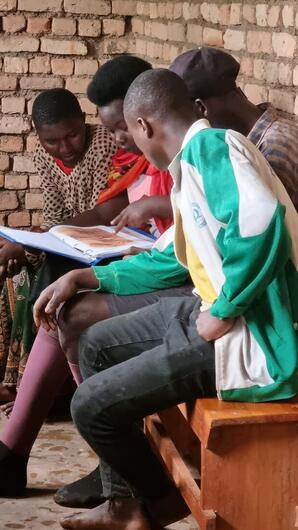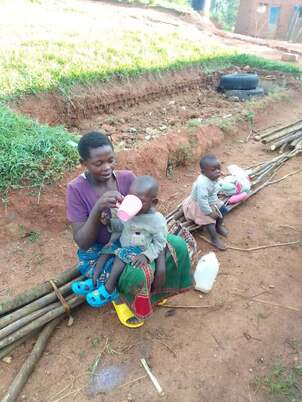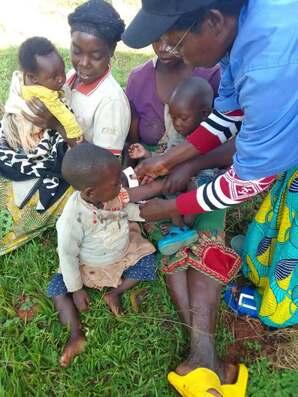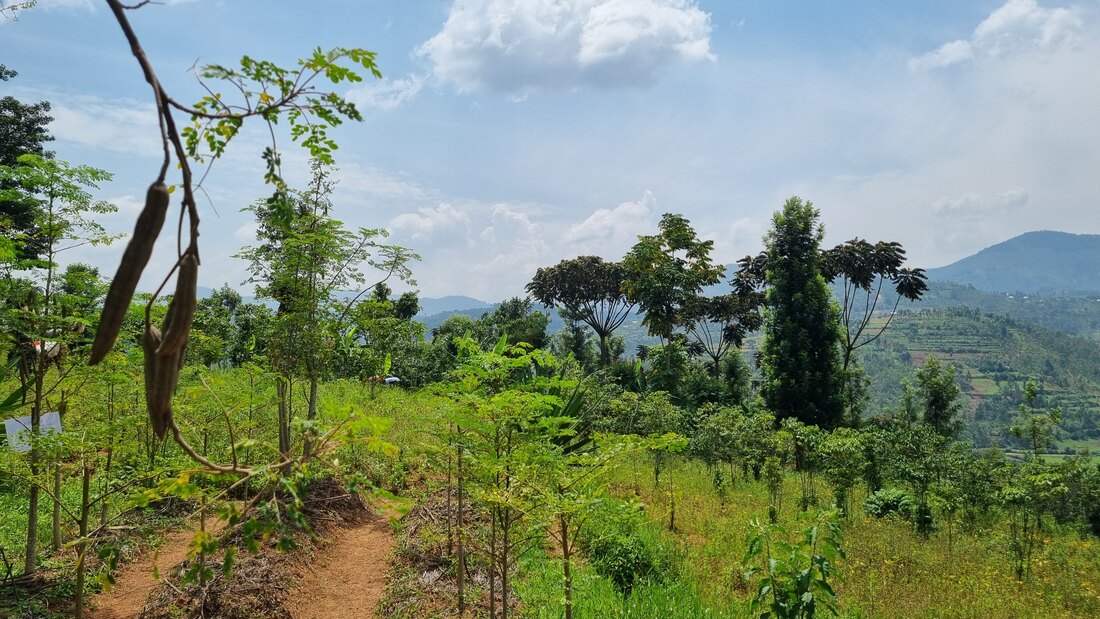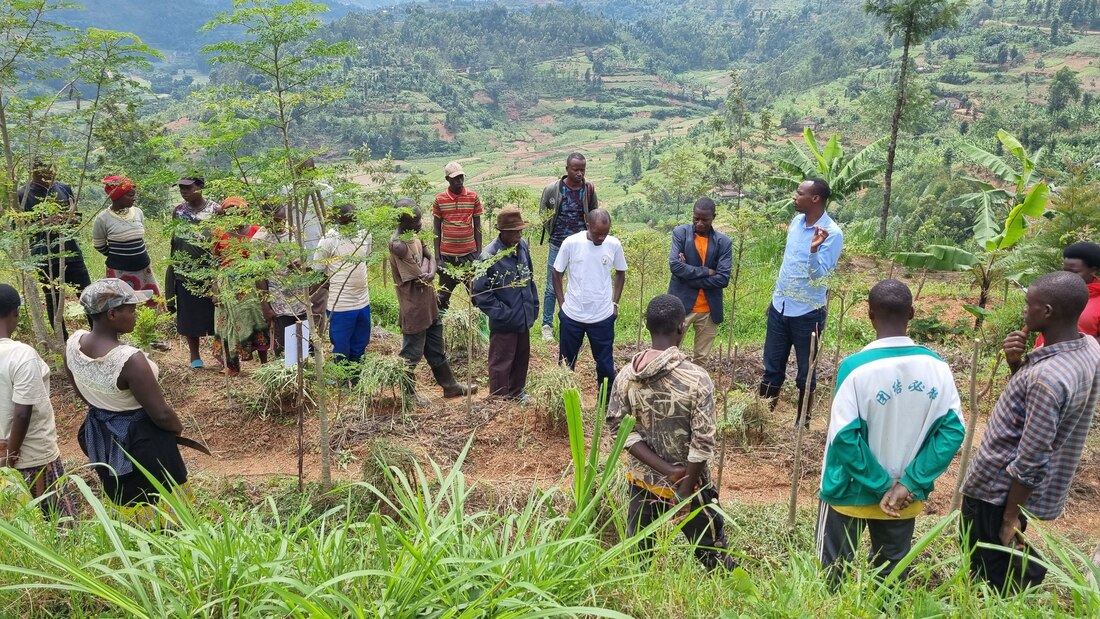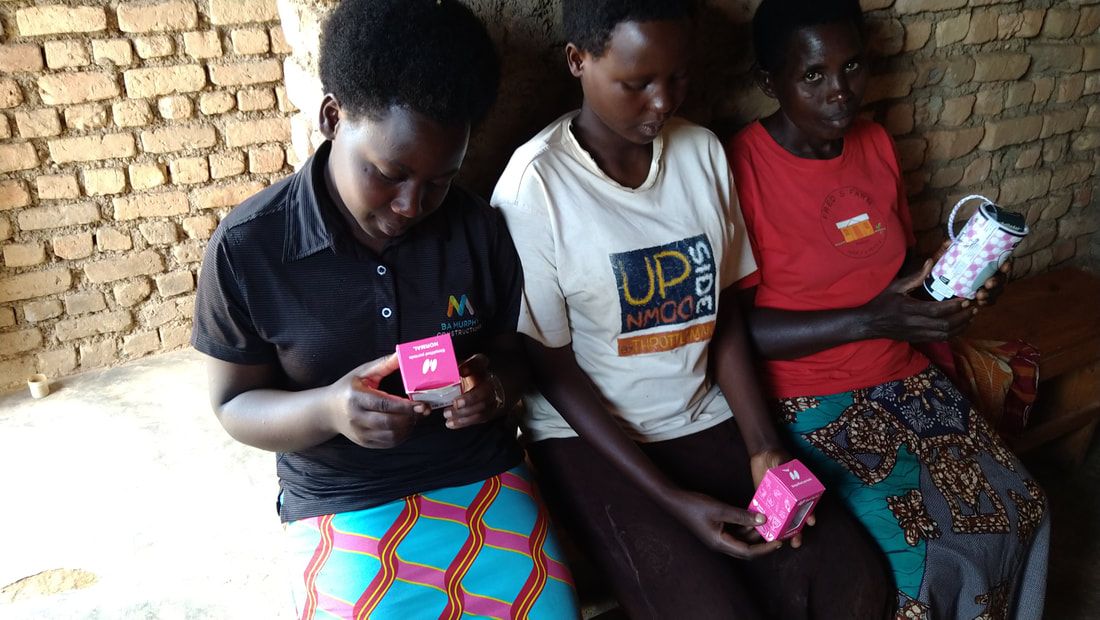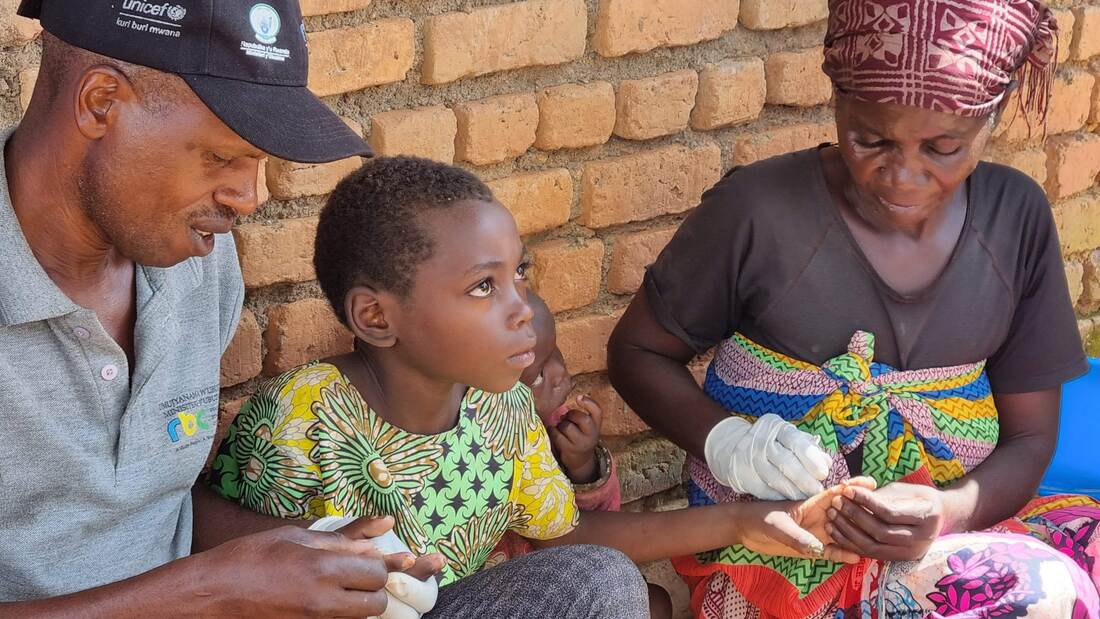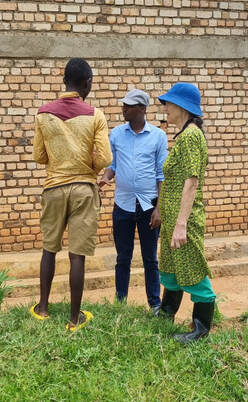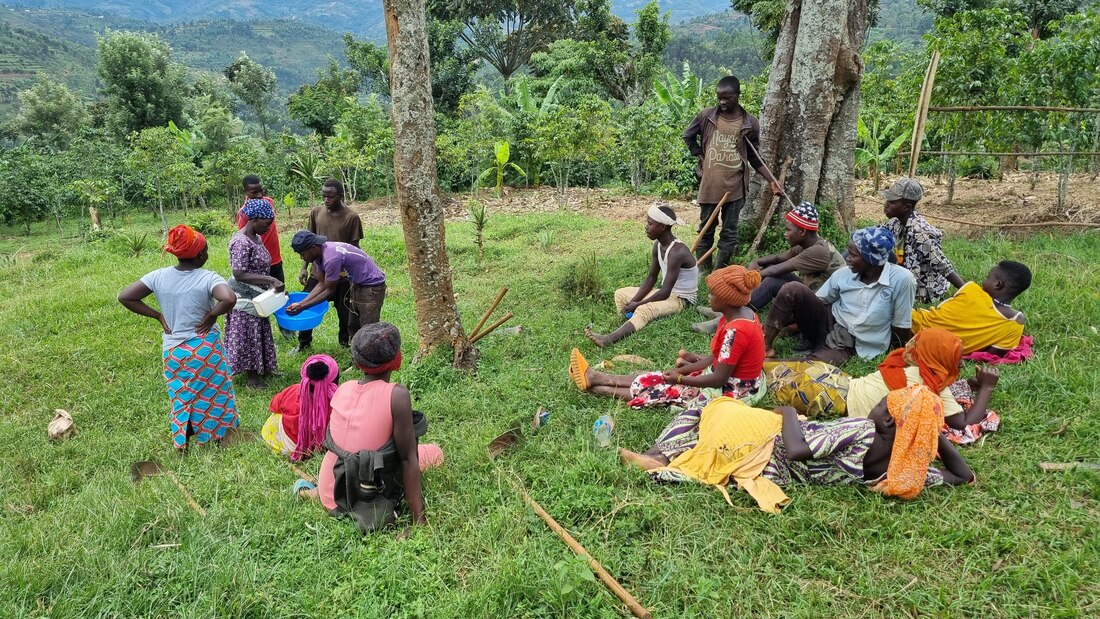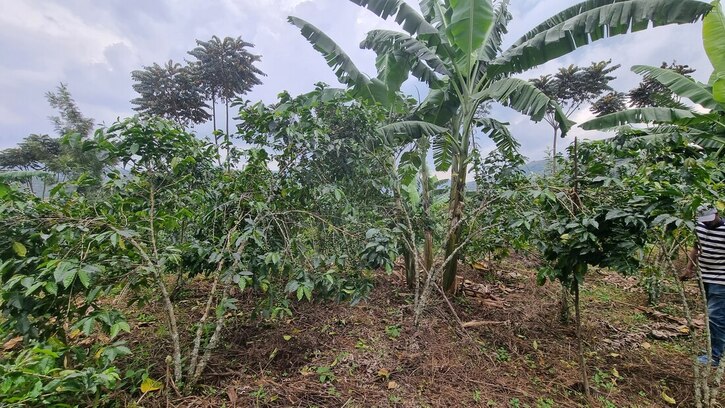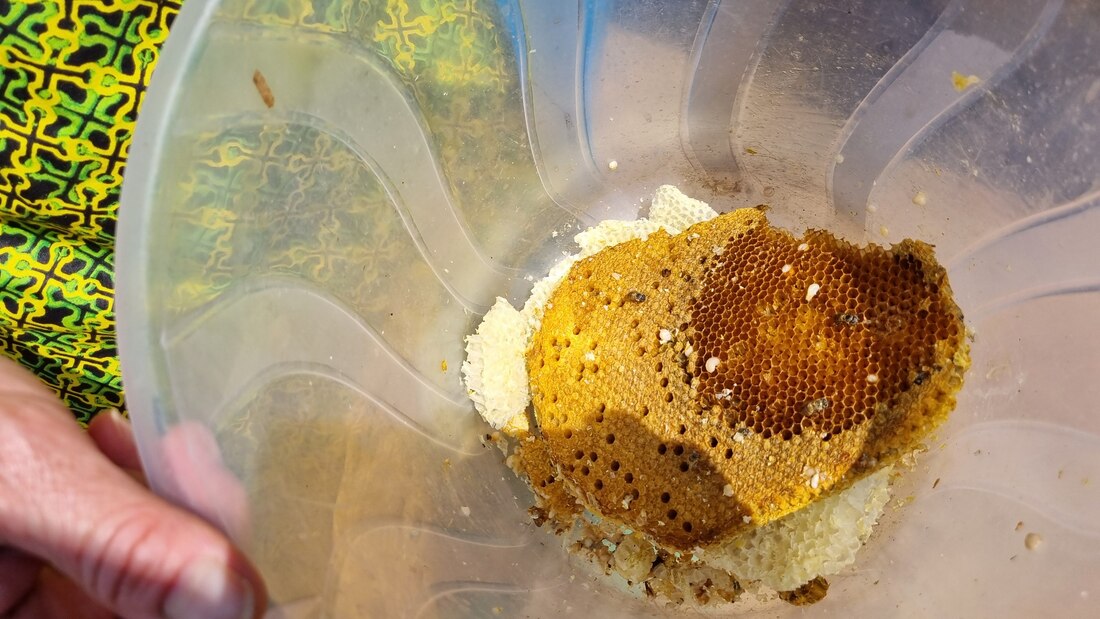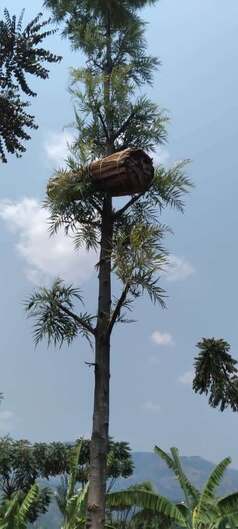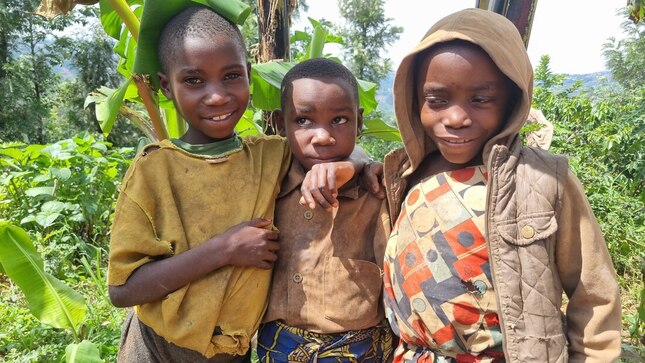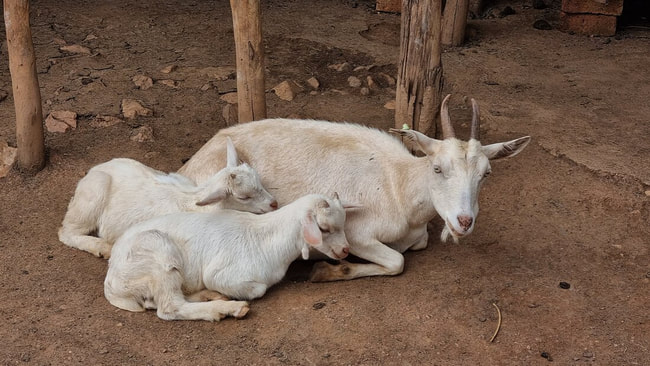|
Visit to FRED’S FARM (FF) 29. January - 17.February 2024 Arriving in Rwanda from snowy winter Norway is always a shock to the sensory system - intense colours, people, clothes and vegetation! This year GREEN was all the more intense as the wet season was exceptionally wet, leaving the farm looking even more lush than “usual”. On our planned first day at the farm, the main road was closed due to a landslide. Some of the staff heading home at the end of the work day. TWA village On entering the Twa village, we are warmly welcomed and ushered to a bench placed in the shade under a banana tree, with the villagers sitting facing us. Here they give an update on the current state of affairs. Top of the list was informing us that 10 children are currently attending school, and from September they plan to send 13! One young mother pressed herself through the crowd to tell proudly that her son had come top of the class - this triggered applause from everyone:) The whole village feels pride in this child’s achievement. The atmosphere oozed “we can, and we will!”! During the last year the Twa have followed up making and using liquid fertilizer, compost and cultivating very small snippets of land around their homes. On our visit to the village, four women proudly showed us their newly germinated moringa. One of FF staff had supported them in this, and Pascasie will now assist to ensure these survive, and more seeds are planted. It is almost a miracle that these little seedlings survive as the areas available for planting are the same as where all other activities take place; making clay pottery, children playing, a path through the village…. one thing happens on top of the other, and little attention is paid to plants. But these tough and patient women, including Alice the village leader, are determined to succeed. KIZI SCHOOL The school principal, the farm and sports teachers always set aside time for our visit, and actively engage to develop ideas. Books for the school library, a few footballs and this year a set of football boots for the whole girls team was met with enormous enthusiasm. The sunlamp library functions well. Pupils in the last year of school, working for national exams, are prioritized. But there aren’t enough lamps for all these pupils. FF supplied 10 new lamps. Some teachers live at the school. With no electricity, it’s a challenge for these teachers to do preparatory work after school hours in the dark. We will look into options for improved lighting. The kitchen garden at the school continues to improve, and they have now established moringa with regular follow up from Pascasie from FF. The moringa is planned as food for the youngest children. For the past 2 years the school has had a few pigs, and on our visit the principal asked if there was any possibility for the school to get a dairy goat. He sees this as an opportunity to provide milk for the children in the nursery school. The school has regular meetings with parents, and this is a golden opportunity to promote goat milk for improving children's health. We have made a formal agreement, a trial one year period. INTERNSHIP PROGRAMME Time limits didn’t allow us to gather former interns on this visit. But the school manager and farming teachers assure us that this initiative gives a chance to those who need it most. The pupils who are prioritized for participation in the programme, are those with the most challenged home situation. The Demonstration Plot which the interns continue to develop, is maturing and beginning to be a true demonstration plot. Trials with different methods of planting to get the best harvest, and utilizing the 3D potential of the plot provide a learning area for the students. Two former interns are now working on FRED’S FARM; Pascasie, our moringa specialist, and Elie, our night watchman who will now also follow up dairy goats in the community. These 2 young adults are highly motivated, and extremely diligent in executing their jobs. Our moringa specialist, Pascasie, teaching interns indoors on a wet afternoon DAIRY GOATS We invited the vet to lead a training session with our goatherd and the farmers who have, or have had, dairy goat bucks from FF. The aim was to learn how to keep the goats healthy, and detect the first signs of sickness. Via FRED’S FARM homepage, we have received many enquiries about dairy goats. Two different groups visited FF during our visit; 4 academics from the Rwandan Institute for Conservation Agriculture (RICA) and 3 employees from a Rwandan NGO. RICA were interested to hear our experience both on the farm and in the local community. The NGO is hoping to start a dairy goat project not so far from FF. Both of these parties can be possible collaboration partners, and we plan to keep in contact. The focus from these 2 visiting groups, and their practical input, was valuable both to learn but also as a real motivator for Daniel (the goatherd), Jacques and ourselves. The follow up of dairy goats in the community has not functioned as intended, primarily due to poor follow up from FF. It has taken time to understand the stumbling blocks, but we see it’s necessary to dedicate time and money to this effort, otherwise it just won’t work over time. So now Elie, a former intern, has the formal responsibility to follow up farmers in the community with purebred dairy bucks who “service” local does, and to have an overview of the first generation of crossbreeds. Three goat kids were born on FF just before our arrival, and just prior to our departure, 2 mothers were invited to bring their children to receive goat's milk. We had also invited a local health volunteer to be present to record the nutritional status of these 3 children. These mothers will come daily at milking time over the next 2 months. The mothers also receive some fresh moringa. Left - A needing child getting goat milk Right - Measuring nutritional status MORINGA, the “miracle tree” To see the mini moringa forest on FF was a true joy! We have really struggled to succeed with this, but now, thanks to Pascasie and increased knowledge of crucial steps, all stages of moringa propagation are healthy - new seedlings, saplings and trees! 364 plants in all! Pascasie keeps an eagle eye on drying, and storage of the dried moringa. Visitors to the farm are now able to see all stages of growth, the drying process, and sample both dried and fresh moringa. Most of our stored dried moringa is now taken to the Twa village where pregnant and nursing mothers are given “medicinal doses” of moringa by the village leader, and our farm manager, Providence. In addition, mothers who bring their children to get goat’s milk at FF, also receive some fresh moringa. Roll -out to the local community has not functioned well, due primarily to our lack of what we now understand is essential, closer follow-up from planting of seeds until the plant is approx. 40cm. From now on, Pascasie has a defined role to assist those who are motivated to grow, and receive seeds from FF. Many people in the local community, including those with key roles in the community (village leader, vet, voluntary health workers, teachers), are interested to learn and try to grow. Left - The moringa field at the farm Right - Local farmers, leaders, vet and staff learning about moringa HEALTH initiatives In previous years, we have invited anyone from the Twa village with the condition “jiggers”, tungiasis, to come for treatment to FF. This year we were informed by the local health volunteers that “jiggers” is now under control in the Twa village, a wonderful step forward! So this year it was an “open invitation”. Our farm manager Providence managed to motivate and encourage 10 children from the area to come for treatment, and also one young mother. In this condition, a parasite enters the skin and lays eggs at their point of entry. Most are affected on their feet but this time round, 3 kids also had lesions on their hands. All three were listless and apathetic, unfortunately a sign of poor nutrition. These children were invited to get milk at FF on a regular basis. One new initiative while in Rwanda was a trial with menstrual cups. Three permanent employees were offered these, and eager to try to use them. In the past years we have been made aware of the challenges of menstruation in the local community; restricted access to clean water and little or no means to make or buy sanitary products. This results in girls not attending school, or not able to work apart from in the fields. Last year we supplied a menstrual cup to our agronomist’s wife who has now one year of positive experience. She is willing to mentor these 3 young ladies who work on FF. Another mini step forward is that our goatherd Daniel has started to use his mosquito net, something he just refused to do before. His mosquito net had been so used it was in dire need of repair. Supplied with needle and thread, he did an excellent job in making it whole again:) His example led to Alex, who manages the homestead and its immediate surroundings, saying he too was motivated to use a net. They both sleep outdoors at the farm. 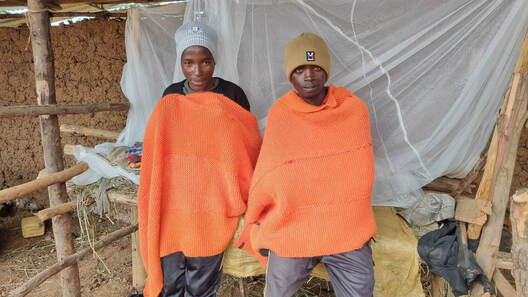 Top left - female staff introduced to menstrual cups Top right - Treating jiggers Below - Daniel and Alex with mosquito net and warm wooly scarves, converted to blankets:) STAFF FF has a policy to give work opportunities to as many as possible. In practice this means that apart from the permanent staff (9 people), there are 10 new staff every second week. We try to give work to those who need it most. On the other hand we need skilled staff who are able to work independently, able to cooperate and are trustworthy. At the moment, our permanent staff are dedicated and motivated. On our visit, we made considerable changes to clarify areas of individual responsibility. Pascal and Damescene, our two most skilled “coffee staff", had a study day on an innovative coffee farm close to FF. They were inspired and came back with ideas for FF, but they also told us proudly of how they had introduced FF and promoted the organic fertilizer they make and use, mulching, our social projects, dairy goats and moringa!! Left - This young man is the eldest of 6 siblings. His parents left the family, first father, then mother. He now has responsibility for his siblings. Jacques tries to assist to get help from the authorities. In the meantime, Jacques offers him work on the FF. Right - staff at midday break. CASH CROPS This year's coffee harvest looks more promising than last, but unfortunately approximately 20% of the land area with coffee on FF is still claimed by other farmers. This situation will hopefully be resolved in the course of the coming year. Coffee: in general, the health of the coffee trees has improved markedly in all areas of the farm. The most healthy are in the areas with the best shade cover, most groundcover and where the soil quality is best. Most of the new coffee planted in the past year survived the dry season, and is very healthy. It will take another 1 - 1.5 years before these new plants bear coffee cherries. A few coffee cherries were ripening here and there, but it will be another month before the harvest begins. Pascal and Damascene, our 2 coffee specialists are dedicated and very motivated to learn. Both grow coffee at home, and have in the past year used savings to rent land and plant coffee. Macadamia: to improve follow up of the macadamia, Joseline, who has worked on FF for several years, is now dedicated to working solely with macadamia. There are 2 varieties of macadamia on the farm; one bears nuts once a year, and the other bears nuts throughout the year. In the few weeks we were on the farm, daily harvest was approx. 1 kg. Macadamia have 2 shells. When dried, the outer shell cracks, and this shell must be removed before sale. We are in the process of looking at options for sale. Last year, most of the harvest was given to a local tree nursery to propagate saplings. These have grown well and are ready for grafting. The agreement is that the proceeds of the sale of these grafted trees will be split 50/50. Banana: FF grows banana as a shade tree on many of the coffee terraces. Production is now greater than the food needs of the staff. So we will start selling bananas as a cash crop at the local market. Good coffee growing together with banana trees. BEES The staff keep a watchful eye on the beehives, looking for a change in bee behaviour. One morning we were informed that the hive must be checked, but unfortunately we were just too late. The bees had eaten the honey and started to swarm. THIS was a cartoon-like experience - a cloud of bees descended over the goatshed, over the house and away! Quite scary, but the experts say that swarming bees are full of honey and peaceful:) The eldest queen bee leads half of her bee colony, and looks for a new home. To our great relief, they found their new home in one of the other beehives on the farm:) The big picture this time round was to focus on finding new ways for better follow up for the cross breeding with dairy goats in the community, and to establish moringa in the community. Both of these initiatives are stepping stones to more sustainable farming and self-sufficiency. The secondary effect of increased self-sufficiency, which we already see, is that more parents prioritize sending their children to school. The fact that the Twa now cultivate, succeed in their savings, send children to school and have “jiggers” under control, has reduced the marginalized position they have experienced in the community. As always, we thank all of you who have given willingly to support FRED’S FARM in different ways! Your contribution is making the difference:) Hanne and Sten
1 Comment
|
Details
Categories |
